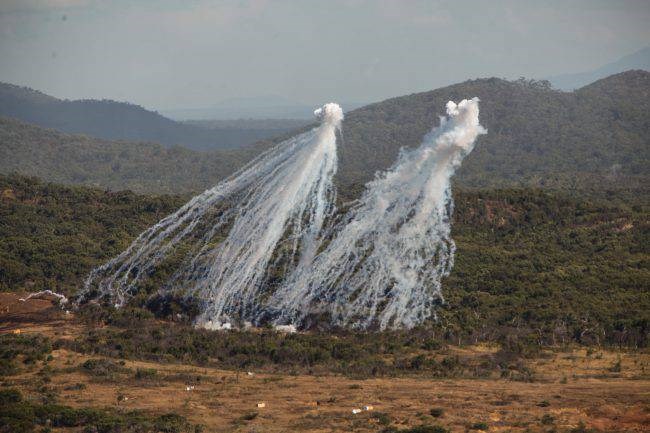
Monday September 10, 2018
Rahul Kalvapalle

In this Aug. 3, 2013 file photo, white phosphorous streaks are seen during a U.S. Marine Corps live-fire exercise in Queensland, Australia.
Russia’s military has accused the U.S. Air Force of using banned white phosphorus bombs during air strikes in Syria‘s Deir ez-Zor province.
The incendiary munitions were dropped on the village of Hajin, resulting in severe fires, according to a statement from the Russian Reconciliation Center for Syria, a branch of the Russian Ministry of Defence.
Death and injury tolls were still being verified, the statement said.
A Pentagon spokesman denied the claims.
“At this time, we have not received any reports of any us of white phosphorus,” said Cmdr. Sean Robertson. “None of the military units in the area are even equipped with white phosphorous munitions of any kind.”
White phosphorus can legally be used to create smoke screens and signals, but its use in civilian areas is banned under the 1949 Geneva Conventions and the UN Convention on Certain Conventional Weapons.
The substance causes horrific burns, and can be absorbed from the surface of the skin, burning deep into the muscle and bone and causing multi-organ failure and death, according to the U.S. Centers for Disease Control.
Dressed burn wounds can reignite when dressings are removed and the white phosphorus is re-exposed to oxygen, meaning that even seemingly minor burns can be fatal.
The U.S. military says it doesn’t use white phosphorus as a weapon, but it has previously been accused of not being entirely forthcoming on the matter — after being accused of using white phosphorus in Iraq in 2005, the U.S. State Department said the substance was only used as a signaling device. But, confronted with evidence, the military later admitted that it used white phosphorus as an incendiary weapon against enemy combatants, the BBC reported.
More recently, U.S.-led coalition forces have also been accused of improper use of white phosphorus in Iraq and Syria, according to Human Rights Watch.
Amnesty International has warned that white phosphorus can be dangerous even when not used as a weapon, because it can burn partially and reignite weeks later, posing a residual risk to civilians.